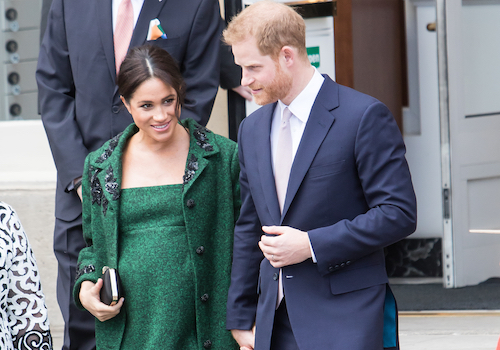
Although the British monarchy lost most of its formal power, it still exercises a number of functions in society: symbol of unity and continuity, devoted servant, and good example. Prince Harry put this last activity in peril when he said he would have no more than two children.
When Prince Harry mentioned having children in an interview with Jane Goodall in the forthcoming issue of Vogue magazine, she jokingly scolded His Royal Highness, “Not too many!”
“Two, maximum!” he replied.
Goodall warned that, without dramatic action, climate change will lead to “people fighting over the last fertile land, the last fresh water,” and Prince Harry agreed that “we should be able to leave something better behind for the next generation.”
Alarmist predictions about overpopulation have had a revival, since a generation has passed since Paul Ehrlich’s Cassandra cries came to nothing. The prince joined a wave of population scaremongering in the name of taming, or fleeing, climate change. In recent months, NBC News has implied that “science proves” we “should stop having” children, and Congresswoman Alexandria Ocasio-Cortez (D-NY) asked explicitly, “Is it OK to still have children?” A growing number of people seek to spare the earth of the estimated 58.6 metric tons of carbon emissionschildren produce annually.
By an act of divine providence, the royal announcement came the same week as the UK’s Office for National Statistics announced the birth rate in England and Wales has hit its lowest level since the ONS began keeping records, in 1938. Clearly, some couples have anticipated the royals’ behavior. The total fertility rate of 1.7 children lags behind the 2.1 children necessary to reach the replacement level – and therein lies the problem.
Leaving aside the issue of climate predictions (and their history of inconvenient errors), let’s assume everything that is forecast will come to pass The experts have estimated the cost of the damage they believe will be caused by climate change. The IPPC found that if the governments around the world do nothing to lower CO2 emissions, which it calls “the no-policy baseline scenario,” it will cause “a global gross domestic product (GDP) loss of 2.6%” by 2100.
Compare that, momentarily, to the cost of a population bust. The IMF found that in the more developed countries, including the UK, the increase in public health spending alone “over 2015–50 is equivalent to 57 percent of today’s GDP, and the present discounted value (PDV) of the increase between 2050 and 2100 would be a staggering 163 percent of GDP.”
To those who would say this values finance at the price of the planet, I gently reiterate: The IPPC estimate expresses the cost of environmental damage in economic terms. The IPPC’s analysis of ecological harm is priced into this figure. It amounts to much less than the likely impact of population reduction. This does not include any other social cost from having fewer children.
The danger of the future is too low a birthrate, not too high.
A childless lifestyle causes a short-term economic boom, as couples spend their money on consumer goods. This increased consumption will largely offset the reduced carbon footprint of not having children; the model assumes that childless adults retain the same work and consumption patterns as they would with children.
But as the childless generation turns gray, the economy begins to slow, or unravel. Multigenerational pension systems exert a greater burden on a smaller base of workers. Productivity will fall, since a smaller cohort of workers cannot produce as much as a larger one. Since the nation has less disposable income, the economy will stall, and the nation’s industrial makeup will shift. The debt racked up by previous generations may begin to constrict the remaining share of the budget.
Naturally, the royal family will be insulated from the poor outcomes of others heeding their virtue signaling. Coincidentally, most Americans and Europeans also say two is their ideal number of children. (Economist Bryan Caplan found that parents would maximize their happiness by having four children.) The couple’s newfound commitment also harmonizes with the imperative for all royal couples to produce “an heir and a spare.”
The notion that this is mere posturing is amplified by the fact that the announcement also coincided with HRH and Markle, and at least 113 others, flying by private jet to Sicily to attend this year’s “Google Camp” on the topic of climate change.
This creates an ethical universe in which, as Joanna Rossiter writes in The Spectator,“you are moral not because of what you do but because of who you are… [R]ather than earn the public’s respect through national service, it’s simply about having a voice on the issue of the day.”
The royal couple will certainly not be considered moral based on the impact of their advice.
Perhaps the British would be more reticent if they knew declining birthrates may be tied historically to the advance of the French?
Thankfully, the Invisible Hand has supplied another role model: Prince William, Kate, and their three beautiful children.
May their tribe increase.
(Photo credit: Mr. Pics / Shutterstock.com. Editorial use only.)

